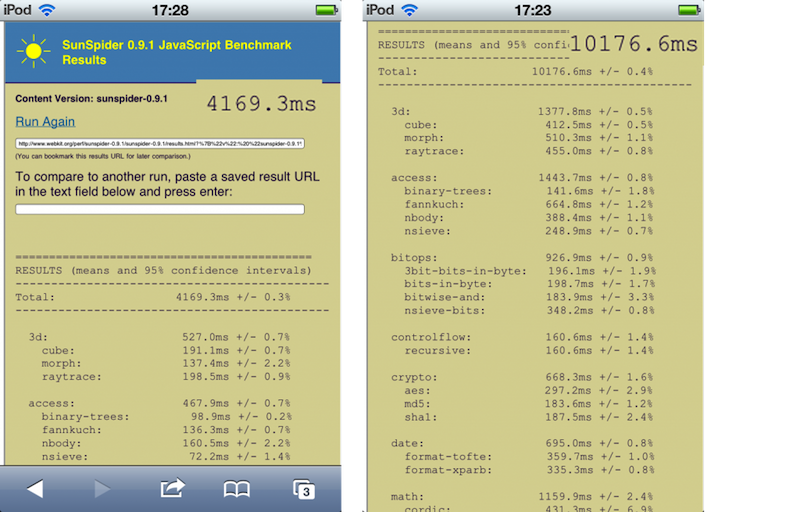iOS 5 supports speedy Nitro JavaScript for full-screen Web apps
Currently, full-screen Web applications fail to use the Nitro acceleration Apple added to iOS 4.3. This can result in Web applications designed for the iPhone running much slower when saved to a home screen than they would if launched directly through the Mobile Safari browser.
But as highlighted on Thursday by CNet, the bug present in current version of iOS has been fixed in the first beta of iOS 5 delivered to developers. According to people familiar with the software, the Web.app feature in iOS 5 now has access to the Nitro JavaScript engine.
The fix was revealed by user "Xuzz" at Hacker News, who said that revealing the information was "probably" breaking their non-disclosure agreement with Apple. "Web.app now has the 'dynamic codesigning' entitlement, which enables Nitro," they said.
In a follow-up question, the user was asked about UIWebViews, which do not currently have Nitro benefits. "Xuzz" said that has not been added in iOS 5, but it's a security restriction.
"They can't give dynamic-codesigning to all apps, or their security (which taht disables, as a requirement to enable the JIT) would then be useless," they said.
SunSpider benchmark tests conducted earlier this year found that the Safari browser on the iPhone would run through code in 4.2 seconds. But a full-screen Web application saved to an iOS home screen would take more than twice as long — 10.2 seconds — to complete.
That's because full-screen Web applications, and native applications using UIWebView, use a different engine from Safari — an internal process called WebSheet.app.
The Nitro engine was first introduced in desktops in June of 2009 with the release of the Safari 4 Web browser. At the time, Apple boasted that Nitro could run JavaScript up to 4.5 times faster than its predecessor.
iOS 4.3 was released in March with the Nitro engine ported from the desktop, and making JavaScript performance twice as fast as it was in iOS 4.2.
 Slash Lane
Slash Lane














 Amber Neely
Amber Neely
 Thomas Sibilly
Thomas Sibilly
 AppleInsider Staff
AppleInsider Staff
 William Gallagher
William Gallagher
 Malcolm Owen
Malcolm Owen
 Christine McKee
Christine McKee










12 Comments
Has something gone wrong with the forum software? Mods?
EDIT: Fixed, apparently, except now my inexplicable objections to wrong thread posting are in the thread where the wrong posts got moved back to. Wheeeeee!!!!!
I am guessing that Safari will be snappier in iOS 5 then
This is interesting. I guess a good benchmark would be the Internet Explorer 9 Mobile Test Drive that Microsoft released this week.
Has something gone wrong with the forum software? Mods?
EDIT: Fixed, apparently, except now my inexplicable objections to wrong thread posting are in the thread where the wrong posts got moved back to. Wheeeeee!!!!!
My mistake. I went back and soft deleted your objection replies just now.
Getting replies in the wrong thread isn't totally unheard of, but I hope it's not a harbinger of deeper troubles. I would be in favor of dumping vBulletin though, it's a nasty mess.
But it may have just been a linking error from the main site too. It seems to work now.
How long does it take for mobile safari to display apple's own mobileme website?
Still waiting.
Maybe after iCloud.